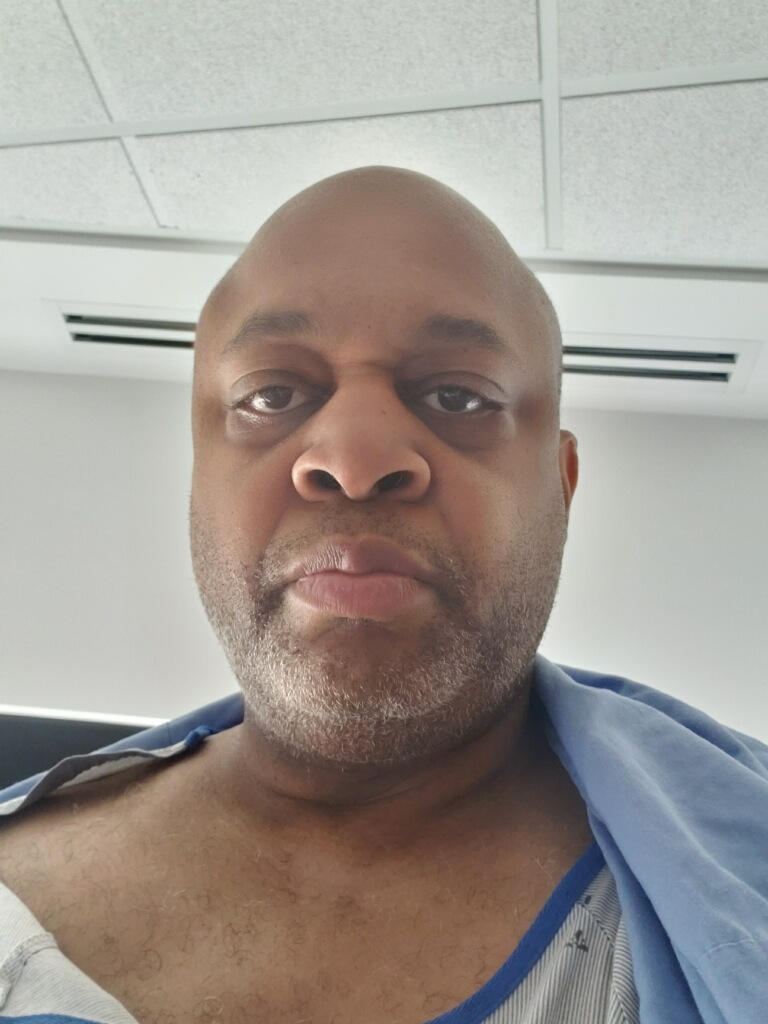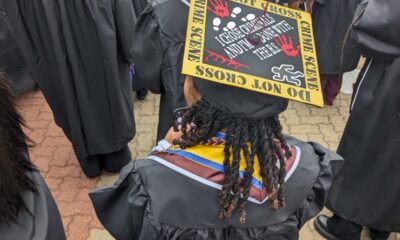Featured
Surviving the Coronavirus: One Man’s Story

Reggie McDonald remembers taking the Metro to his job as a logistics manager for the Department of Homeland Security on March 12th which was his last day working in the office with co-workers. Americans were on the front end of what the World Health Organization had just declared a global pandemic. And, like thousands of others and hundreds of times before, McDonald grabbed a handle on the subway car, no seats were available.
“That’s where I think I got it, was in the Metro train system,” McDonald said. “Folk sneezing in their hands. There are tons of us going up and down those escalators. I remember in those days the trains were very packed.”
The next few days while working from home, McDonald had a runny rose but because of his allergies didn’t dwell on it. Then, on the 19th he had a major presentation via teleconference. A persistent cough caught his supervisor’s attention.
“My supervisor got the phone and said, ‘Are you alright?’ I said, ‘I think it’s a cold,’” McDonald explained. “I had to hit mute multiple times to cough.”
Four days later, the retired Air Force Lieutenant Commander had lost his appetite, had a persistent cough and alternated between sweats and chills. He and his wife, Thelma, went to the hospital where he was tested for the coronavirus and sent home. He continued to take over-the-counter medications to fight the fever, diarrhea, and the coughing.
McDonald said the hospital called each day to check his condition. They told him he didn’t have the “regular flu” because the test had come back negative. They were still waiting on the results from the coronavirus test.
By the 28th, there was still no test result, but McDonald knew he was on a slippery slope. He couldn’t talk on the phone without getting winded and walking down the stairs had become nearly impossible. He and his wife returned to the emergency room where doctors took a chest X-ray and gave McDonald a “walk test” to evaluate his oxygen level.
He recalled, “I took 10 steps, and I was in the 80s.”

There was still no coronavirus test result but based on the X-ray and other indicators, doctors decided to send him to Walter Reed National Medical Center, the prominent military hospital.
Once he arrived, the enormity of the challenge he faced became clear.
“It’s Sunday morning about 2:00 a.m.,” McDonald stated. “They were very professional and very blunt, too. They let me know, ‘Mr. McDonald, we have a decision to make, to put you in ICU or one step above. But, based on your medical history, which is very good, we’re going to put you one step above.’”
Doctors started McDonald on oxygen and the malaria drug, Plaquil. And, for the next 48 hours, he called on his faith and military training to battle a virus laying claim to the world order in ways unprecedented in recent memory.
Fighting on All Fronts
In countries around the world, governments have implored its citizens to engage in social distancing and limited group encounters unimaginable a few months ago to “flatten the curve” which gives hospitals time to accommodate the inevitable patient load but in a gradual fashion as opposed to a rapidly overwhelming increase.
According to NPR, the “United States is reporting more COVID-19 cases than any other country in the world.” The report cites information from Johns Hopkins University’s Whiting School of Engineering which indicated 350,000 people have tested positive. The Trump Administration predicted the next two weeks will be “very tough” as the country passed the grim milestone Monday of more than 10,000 deaths from the disease.
With most businesses closed, the economic damage is “a huge, unprecedented, devastating hit,” former Federal Reserve Chair Janet Yellen told CNBC. A record 6.65 million Americans filed for unemployment the week ending March 28th. And, Congress has passed a 2-trillion dollar stimulus package to cushion the economy but is already talking about additional assistance. House Speaker, Nancy Pelosi, said the virus is “moving swiftly” and emphasized the necessity of a prompt response from her colleagues.
A Guardian Angel
While the daily adjustments continued outside the walls of the military hospital where McDonald lay, the 52-year-old focused on his challenge: getting well. He leaned on his training from deployments to Iraq and Afghanistan.
“There’s a mentality that you have to have to be successful,” he remarked. “You always know that the mission that you’re doing is bigger than yourself.”
He encouraged himself to remember “you have a lot of family and friends who are pulling for you.” He forced himself to eat and to do “exactly what they tell me to do,” soldiering on when he was denied food intravenously because an I-V tube coupled with oxygen would possibly have created fluid in his lungs. At times, his fever raced close to 104 degrees. In fact, his turning point may rest on a fever-laced dream marked by a conversation with his mother who passed in December.
“I will say I’ve had a tough time with that,” McDonald shared. “I was having a conversation with her, and it seemed so real. I was sitting in the basement at her house with her right in front of me. And, she was telling me, ‘You know my leg was hurting and it’s not hurting anymore.’ And, she was pointed at me like only she could and said, ‘You’re going to be alright.’ And, I was thinking I was talking to my mom, and I woke up and I was in a hospital. It was incredible.”
That was early on Tuesday, March 31st. The fever started going down. Two days later, McDonald left the hospital for home.
“I was very excited when my wife came to get me, but they wouldn’t let her come upstairs,” McDonald explained. “The doctor, he and I walked downstairs. He would not allow me to get in the car until he fully briefed her about what was going on. He gave her a mask and I sat in the back seat as far away as possible…I had a mask.”
McDonald’s wife, Thelma, is awaiting her test results for the coronavirus and is hopeful.
“My vitals are great…and Reggie has just come from zero to 100,” she said. “Those first two days I was just left with my prayers and my faith, but I did not feel defeated. I felt so strong in my faith and our faith. And, when he called, my faith was validated. He sounded stronger, and I was so happy to hear him, and from then on, I was very comfortable.”
The McDonalds will continue to keep their distance within their home until Saturday. In the meantime, each is reflecting on their brush with the disease redefining lives around the globe.
“Folks say there is no testimony without a test,” McDonald mused. “This was my test. There is no question that God brought me through this.”

-

 Featured10 months ago
Featured10 months agoCalifornia Is the First State to Create A Public Alert for Missing Black Youth
-

 Featured10 months ago
Featured10 months agoAfrican American Leaders Stay the Course Amid Calls for President Biden To Bow Out of Race
-

 Featured10 months ago
Featured10 months agoThe Debate Fallout Lands on Both Candidates
-

 Featured9 months ago
Featured9 months agoPresident Joe Biden Decides to Withdraw from the Presidential Race
-

 Featured9 months ago
Featured9 months agoIn One of His Final Speeches as President, Biden Says It’s Time for ‘Fresh Voices’
-

 Featured10 months ago
Featured10 months agoPresident Joe Biden Describes Shooting of Donald Trump As ‘Sick’









